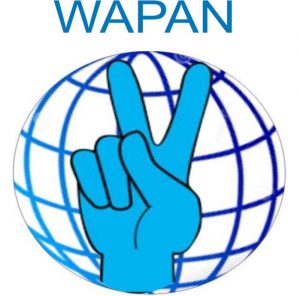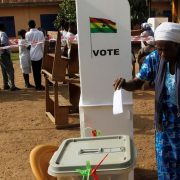Nonviolent Resistance to Peaceful Election Outcome in Ghana (December 7, 2020)
By: Adu-Twum Sadiq & Issifu Abdul Karim

It is not a man’s duty, as a matter of course, to consecrate himself to the obliteration of any, even the enormous wrong. But he may still properly have other concerns to engage him. Nonetheless, it is his duty to avoid any destruction, but use what ‘Ghandi’ calls “Ahimsa” – Nonviolent love. Element of violence has always been when a section of the society feels deprived of their basic needs/rights and identity, and this many view as a just cause to protest either violently or nonviolently, but the latter is what peace practitioners advocate. The sign of ‘peace’ at the world stage is so unclear, giving the ongoing fuse between the United States (US) and Iran either using the new media in threatening, notably by president Trump, or attacking installation within nations allied to the US. For instance, many international relations experts, including Dr Vladmir Danso have warned Ghana to intensify its internal security and be very strategic in contributing to global security peace as is a host of a US Base in the country.
Traditionally, when conflicts are resolved by violence, they simply involve the triumph of one protagonist over the other. Such a resolution may occur via threat (boot for boot), persuasion or compulsion by naked force such as what Ghana witnessed during the Ayawaso by-election in January 2019. The presumption yardstick is that one side wins and the other side lose: what the economics of war referred to as “zero sum game or power”. Such phenomena should not degenerate into violence, though Africa elections have always been greeted with violence as a result of ill will and manipulations by the election supervising authority or regime control. Tactics such as disenfranchisement, blind transparency, security intimidation and suppressed inter/multi-party among others have been used in most African elections by the incumbent government or the electoral commission, leading to armed conflicts. Against this background, the Ghanaian populace demands a transparent, free, fair and credible elections to be organized by the electoral commission of Ghana in December 7, 2020. Also, the Ghanaian government through the state security agencies has the responsibility to protect citizens and provide an enabling environment – without interference – for the electoral commission to operate as an independent body.
However, in the occasion where the electoral commission, the government or opposition fails to deliver what is expected of them for peace to prevail, the Ghanaian people must apply nonviolent resistance to express their grievances and not resort to armed confrontation. Nonviolent resistance is an organized popular resistance to government authority which – either consciously or by necessity – eschews the use of weapons of modern warfare. It as an application of unarmed civilian power using nonviolent methods such as protests, strikes, boycotts, and demonstrations, without using or threatening physical harm against the opponent. Other methods include symbolic protests, political and social non-cooperation, and nonviolent intervention – that individuals and groups have used to mobilize publics to oppose or support different policies, to delegitimize adversaries, and to remove or restrict adversaries’ sources of power. Nonviolent resistance has become a strategy for sociopolitical change, especially in undemocratic and authoritarian regimes, and has proven to be more effective than the violent method. For instance, “between 1900 and 2006, nonviolent resistance campaigns were nearly twice as likely to achieve full or partial success as their violent counterparts.” (Chenoweth & Stephan, 2011:7). Celestino and Gleditsch (2013) adds that nonviolent conflict is much more likely to lead to subsequent transitions to democracy than violent conflict tactics.
It is important to apply nonviolent campaigns because it does not only provide recognition and somewhat legitimacy to the grievances of protesters, or provide greater internal and external support/sympathy, but it also undermines regime’s main sources of political, economic, and even military power. Conversely, adopting armed resistance in the December 2020 elections will produce detrimental costs, such as lack of mass participation, low international and local support/sympathy, and the regime can justify its repression against the protesters. Evidence about the effectiveness of nonviolent resistance can be gathered from Burkina Faso, Sudan, Tunisia and Egypt among others. With this nonviolent alternative in place, security peace is more likely to attain in the December 2020 elections in case of any contingency.
References
Celestino, M. R., and Gleditsch, K. S. (2013). Fresh carnations or all thorn, no rose? Nonviolent campaigns and transitions in autocracies. Journal of Peace Research, 50(3), pp. 385-400.
Chenoweth, E., and Stephan, M. J. (2011). Why civil resistance works: The strategic logic of nonviolent conflict. New York, Columbia University Press.
Writers: Adu-Twum Sadiq & Issifu Abdul Karim (West Africa Peace Ambassadors Network).



